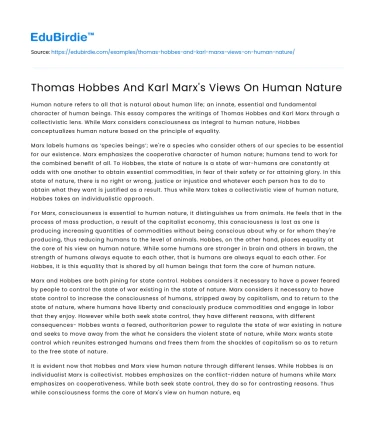Human nature refers to all that is natural about human life; an innate, essential and fundamental character of human beings. This essay compares the writings of Thomas Hobbes and Karl Marx through a collectivistic lens. While Marx considers consciousness as integral to human nature, Hobbes conceptualizes human nature based on the principle of equality.
Marx labels humans as ‘species beings’; we're a species who consider others of our species to be essential for our existence. Marx emphasizes the cooperative character of human nature; humans tend to work for the combined benefit of all. To Hobbes, the state of nature is a state of war-humans are constantly at odds with one another to obtain essential commodities, in fear of their safety or for attaining glory. In this state of nature, there is no right or wrong, justice or injustice and whatever each person has to do to obtain what they want is justified as a result. Thus while Marx takes a collectivistic view of human nature, Hobbes takes an individualistic approach.
Save your time!
We can take care of your essay
- Proper editing and formatting
- Free revision, title page, and bibliography
- Flexible prices and money-back guarantee
For Marx, consciousness is essential to human nature, it distinguishes us from animals. He feels that in the process of mass production, a result of the capitalist economy, this consciousness is lost as one is producing increasing quantities of commodities without being conscious about why or for whom they're producing, thus reducing humans to the level of animals. Hobbes, on the other hand, places equality at the core of his view on human nature. While some humans are stronger in brain and others in brawn, the strength of humans always equate to each other, that is humans are always equal to each other. For Hobbes, it is this equality that is shared by all human beings that form the core of human nature.
Marx and Hobbes are both pining for state control. Hobbes considers it necessary to have a power feared by people to control the state of war existing in the state of nature. Marx considers it necessary to have state control to increase the consciousness of humans, stripped away by capitalism, and to return to the state of nature, where humans have liberty and consciously produce commodities and engage in labor that they enjoy. However while both seek state control, they have different reasons, with different consequences- Hobbes wants a feared, authoritarian power to regulate the state of war existing in nature and seeks to move away from the what he considers the violent state of nature, while Marx wants state control which reunites estranged humans and frees them from the shackles of capitalism so as to return to the free state of nature.
It is evident now that Hobbes and Marx view human nature through different lenses. While Hobbes is an individualist Marx is collectivist. Hobbes emphasizes on the conflict-ridden nature of humans while Marx emphasizes on cooperativeness. While both seek state control, they do so for contrasting reasons. Thus while consciousness forms the core of Marx's view on human nature, equality is central to Hobbes' view.






 Stuck on your essay?
Stuck on your essay?

